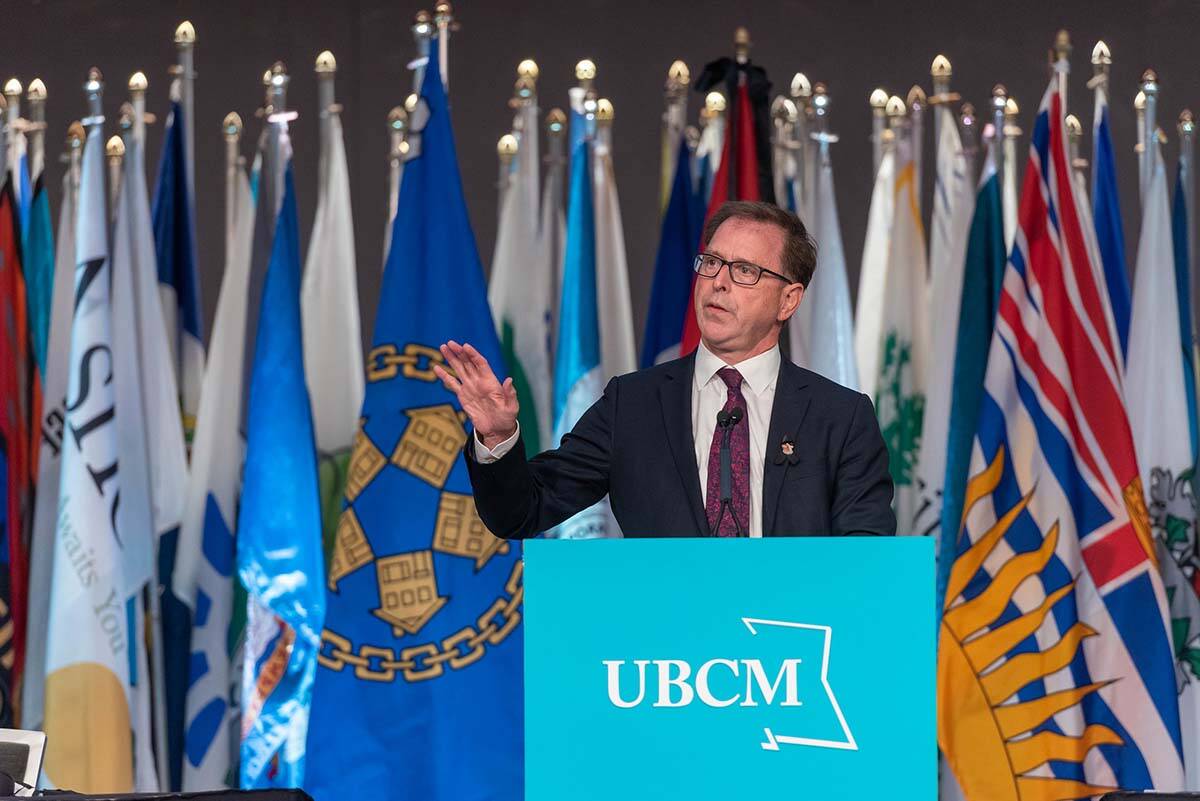There was a general sense of frustration among hundreds of community leaders at the Union of B.C. Municipalities convention in Whistler Tuesday (Sept. 13), as Adrian Dix failed to announce any concrete steps the province is taking to solve the healthcare crisis.
The main speaker of a panel on re-envisioning B.C.’s healthcare system, the health minister was expected by some to spell out what specifically the province is doing. Instead, he spent his 20-some minutes commending health care workers on what he described as “the best COVID response in the world” and reiterating challenges and solutions to the crisis.
The panel of mayors, doctors and paramedics who followed Dix’s speech expressed a far greater degree of urgency.
The topic was debated amid Week 1 in the five-week campaign period for the civic election on Oct. 15.
Clearwater’s current mayor Merlin Blackwell, who is running for re-election, said his community of just over 2,000 people has seen more than 60 closures of its emergency room since the start of the year – usually for about 13 hours, but sometimes longer.
The community only has two ambulances, and Blackwell said one of those has only had enough emergency crews to staff it a few times since the May long weekend. Blackwell said their crew is down about 40 per cent. Sometimes, their ambulances are called to other Interior communities in need, leaving Clearwater residents without emergency care for hours on end.
This was the case in August when an eight-month-old baby went into cardiac arrest and died because Clearwater’s ambulance was in Kamloops.
READ ALSO: 8-month-old baby dies in B.C. Interior town while waiting for ambulance
Gaby Wickstrom, incumbent mayoral candidate in Port McNeill, said her community is similarly struggling from emergency rooms closures.
“Things are at a critical level,” she said, adding that a shortage of workers is leading to burnout and driving prospective health care workers away.
READ ALSO: Port McNeill doctor speaks out on the region’s unfolding health-care crisis
The issue extends beyond rural communities too.
Pete Fry, an incumbent City of Vancouver councillor running for re-election, said a combination of staff shortages, mental illness, the poisoned drug supply, a lack of housing and the ever-rising cost of living have created a painful situation for the city.
“The new normal is staffing shortages,” he said.
Last month, paramedics in the Lower Mainland warned people that ambulances were severely understaffed, with zero running in Maple Ridge on Aug. 20. Across the province, there is a shortage of about 1,000 paramedics.
Experts offer solution ideas
Asked for possible short and long-term solutions, a panel of experts had a variety of overlapping suggestions.
Troy Clifford, president of Ambulance Paramedics and Emergency Dispatchers of BC, as well as Valemount family physician Dr. Ray Markham agreed that more community-level training is necessary. Paramedics, doctors and nurses need to be able to receive training in their home communities, the two reiterated.
Markham added that there need to be fewer barriers to international medical graduates practising in B.C., as well as Canadian-trained health care workers transferring from other provinces or even other health authorities.
READ ALSO: Regulations prevent foreign-trained B.C. doctor from practising
Former health minister and policy consultant George Abbott suggested the province develop an incentive package to bring recently-retired doctors and nurses back for a few years while long-term solutions are implemented.
Several also pointed to primary care networks, which the province began rolling out a couple years ago, as a hopeful path forward. The team-based models combine care from doctors, nurses, pharmacists and social workers.
Dix says panel wasn’t the place for announcements
Defending his decision not to announce any specific action at the convention, Dix said the panel was meant to be focused on discussion.
“This wasn’t a set piece for me to give an announcement,” he told reporters after the panel.
More changes are coming, he said, pointing to the $118-million in interim funding for family physicians the ministry promised at the end of August. The province and Doctors of BC remain in talks about a long-term solution to the current fee-for-service payment model.
Dix said he’ll have more to say soon about supporting ambulance and paramedic services, which was delayed by the death of Queen Elizabeth II on Sept. 8.
READ ALSO:
- Primary health care `collapsing’ in B.C. rural communities, critics say
- Youth hockey player with neck injury waits 42 minutes for ambulance in Penticton
- 5-minute 911 wait times now the ‘new normal’ call takers union says
- ‘Public safety issue’: 40% of non-emergency calls in Vancouver going unanswered
@janeskrypnek
jane.skrypnek@blackpress.ca
Like us on Facebook and follow us on Twitter.

